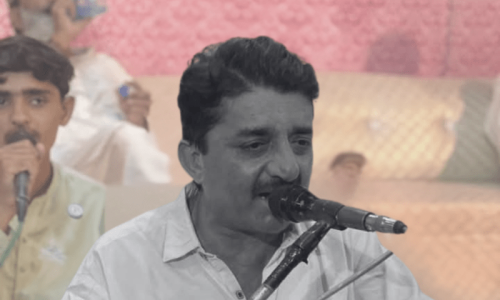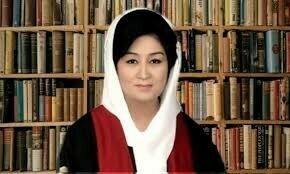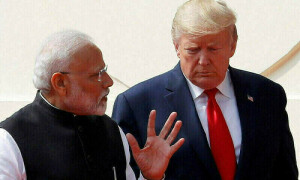‘A light beating’

A HUSBAND and wife in Pakistan can never be alone again. In between them sit the clerics of Pakistan’s Council of Islamic Ideology (CII). However small the space may be, the mullah in the middle would like to prescribe what is to happen between them. He tells the wife that she is secondary — an obedient child at best, a hostage at worst.
To the husband he hands a cane, and the licence to use it, and to the wife he hands some cloth — she can decide whether she wishes to use it to gag herself or do something worse. She must not talk too much; she must obey; she must at all times live an existence that is silent, secondary and submissive.
The council would never, of course, admit to the invisible cleric they would like to position between the wedded couples of the country. They have, however, announced their prescriptions loud and clear. In reviewing the Punjab women’s protection bill, a hallmark achievement that made the mistake of treating Pakistani women as (gasp!) full citizens, who must not be beaten by husbands or imprisoned in marriages, the council came out with a set of decrees that effectively makes marriage a union of three: the man, the woman and the mullah.
Not only has it decreed that a man can beat his wife lightly if she is ‘defiant’ (with ‘defiant’ conveniently left for the husband to define), they have also mandated that the current form of khula, or divorce initiated by the wife, goes against Islamic principles. In addition to being openly misogynistic — which Islam itself is not — the provisions insist that a dated interpretation of religious law is the only valid one. Prominent Quranic scholars have pointed out that the interpretation of Surah Nisa’s ayat 34 has been translated and interpreted to mean ‘to beat’ only because the task of legal interpretation, or fiqh, has for too long been dominated by men. When all judges and legal scholars are male, it is no surprise that their decrees favour men.
The CII has come out with decrees that effectively make marriage a union of three: the man, the woman and the mullah.
Similar liberties with Islamic law are also reflected in the decree on khula. One known principle of Islamic law is inference and deduction, according to which khula is a means which permits the wife to initiate divorce proceedings. If, as the council says, the husband’s permission is a requisite for such a decree, then the whole purpose (and deductive logic) of the provision itself would be in question. If the husband’s permission is required, then there really is no point for the khula provision itself. Simply put, CII’s provision challenges the internal logic of religious law.
Those of course are doctrinal issues — the products of scholarly understanding, reading and research of the sort currently unpopular in Pakistan’s populist and fervently anti-intellectual moment. Judging by CII’s tone, the pro-women aspects of Islamic law dating from the time of the Holy Prophet (PBUH) can be disregarded simply because they may bear a resemblance to late 20th-century feminist movements in the West.
In simple terms, the thought is that the Muslim faith must be shorn of all provisions of justice and respect for women because certain religiously inspired elements feel that they may lose power and political constituencies if they do not appear sufficiently anti-Western. Anti-Westernism has, thus, become more important to the Council of Islamic Ideology than the task of furthering the spirit of the Islamic faith.
The council is a constitutional body that is supposed to decide whether or not a piece of legislation is repugnant to Islam, even though Pakistan’s Constitution already requires laws to be compatible with Islamic injunctions. Despite this redundancy of purpose, CII has churned on, coming out with some 60 reports, nearly all of which relate in some way to women (one that did not was issued in late April and required the government to replace paper currency with gold coins). Sadly, as the decades have marched on, the CII clerics (whose collective qualifications in the study of Islamic law should be made public) have veered from the task of judging laws to see if they respect and promote the spirit of Islam, to being concerned with whether or not they provide a sufficiently drastic contrast from what may be the laws in Western countries.
The latest prescription fits the model well. In making their latest pronouncement, that men can lightly beat their wives, CII was successful in gaining the attention of nearly every Western media outlet. News agencies, from BBC to CNN, were eager to cover the stipulation (even as they ignored the fact that CII can only provide recommendations and not create law) and highlight the implication that domestic violence in general was now legal in Pakistan.
The sensationally phrased pronouncement by the council, like its deliberations on other recent issues, was not intended to explain or further the spirit of a faith which has always been pro-woman but rather to gain international attention and add to the political clout of the clerics on CII. Being anti-Western, visibly and flagrantly, carries political advantages for Pakistan’s religious clerics, and in availing themselves of these advantages they seem to have forgotten the purpose of their positions.
CII was supposed to function as a non-political body that could provide advice and guidance on Islamic principles regardless of whether or not they were similar to provisions existing in the West. Sadly, it seems to have become preoccupied with petty politics; its pronouncements linked to taking anti-Western positions even if the latter accord with those of the Muslim faith.
The writer is an attorney teaching constitutional law and political philosophy.
Published in Dawn, June 1st, 2016












































